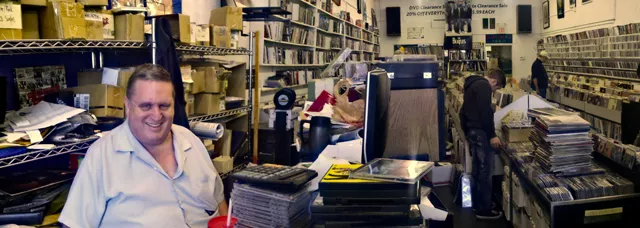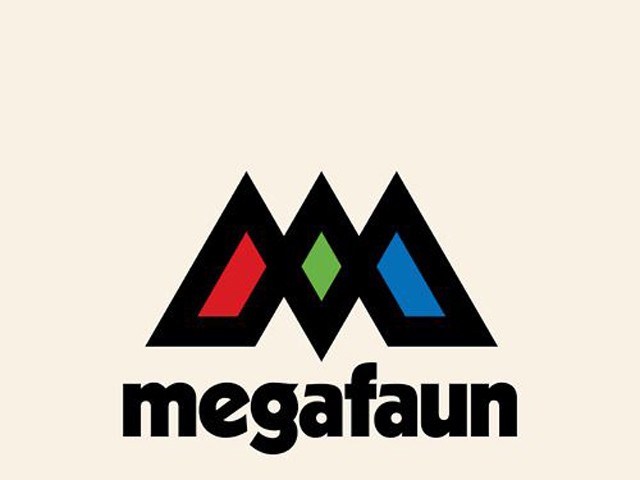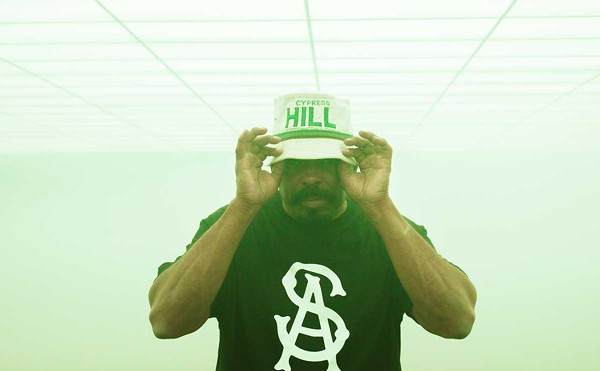Ferndale's Record Collector used record store has been kicking for 30 years this month. That's something. It's not easy keeping a record store alive these days — just ask the owners of two long-standing local "brands" that recently shuttered, Car City Records and Record Time. Each was ensconced in the community and, we thought, immune to cultural shifts. Such closings are scary stuff for countless hardcore music fans — and those who'll likely never abandon the idea of owning tangible albums and collections, or those who care about sound quality and spending hours going through bins in a record store.
Well that's not to say the man who MT managing editor Brian Smith calls the "Mayor of Ferndale" hasn't achieved much simply by making his business work, by hook or by crook, for a full 30 years. In the Detroit area, that alone is reason for Detroit pride. Not that you'd know it talking to the Record Collector's proprietor Warren Westfall.
"First of all," Westfall says, "it would be remiss of me to not mention the fact Jeff Garbus over at Record Graveyard in Hamtramck has been doing this for 30 years too. But also, who cares that I've been open 30 years? In the great scheme of things, what does it matter? It has as much to do with my employees as it does me."
Trustworthy employees or no, Westfall admits he doesn't know how much longer he'll continue ("It's not if I'm going to go out of business, it's when). It's sad, really, that music as an art form has become devalued to such an extent that many think it should be free. But should it? Well, much of the quality in the glut of zillions of songs available for little or nothing online is awful, to be sure. And when you have a zillion bad choices, you have zero choices. Whether there are enough people bucking prevailing download attitudes to keep some record stores, even as a niche, is yet to be seen.
"Downloading is inevitable," Westfall says. "I don't have to like it. Music has truly become a product and a commodity like a shirt, and it doesn't have that much depth. People don't care about it with quite the same passion. My interpretation is that the culture war is over and we lost.
"I'm a minor league audiophile," he continues. "I like good sound but downloading is what sells. It doesn't matter if it's shitty sound, it's what people will do. I was reading that Blu-ray only has three to five years because people will just be streaming off the Internet. That's shitty sound and shitty picture. AM radio sounded great until the first day you heard FM. With downloading, we're going back to AM. Maybe hi-def AM, but AM nonetheless. The sound isn't that good, but maybe for the commodity culture it's all that's required. It's like, as much as I love real jazz, sometimes I can make a better case for smooth jazz. It's got tunes and people like it. That I think less of it is my problem, not theirs."
That's Westfall. A large honest dude who's outwardly modest — even self-effacing to a fault — and articulate as all get-out; the guy can talk on most any subject with an informed, researched opinion. (Just get him rolling on the value of personal accountability as it pertains to the larger context of community well-being.)
And he's almost as happy talking of other used record stores as he is his own, including the one that sat across the street from his own 9 Mile shop. "When Record Time was over here, we had a great relationship," Westfall says. "We both took the attitude that it gives people an extra reason to come to Ferndale. If I don't get the sale, you do and vice versa. We probably drew more customers together than we would have done individually."
To understand how Westfall's a walking history book of modern Detroit record store history, you should know he was an outsider-y kid growing up in Warren whose own music obsession got him into the retail racket.
"In the early '60s, the department stores were selling mono records for 39 cents because they were getting rid of them as they transitioned to stereo," he says. "I was buying jazz records, then you'd see the other album covers on the inner sleeve and pick more. I was just buying these 39-cent records with my paper-route money. One record wasn't enough and 10 definitely wasn't enough. More music. It all made sense to me in my mind. In 1976, I started working for Harmony House [Records]. I was there for a few years and eventually another chain made me an offer, Full Moon Records. I took over in 1980 running the store in Pontiac. The economy sucked."
He lost that gig in 1981 and began working at the storied Sam's Jams record shop for only about six weeks. "There's a story there that I won't go into," Westfall elaborates. That store, their second location, happened to be where Record Collector sits now.
Having paid his dues in other stores, Westfall decided to open his own, with a small loan from his father-in-law. What better place than in a Detroit multiracial community?
"[Mayor] Coleman Young said that for the city to come back, the international sign of commitment is putting your ass on the line, so I opened my business in Detroit," Westfall says. "I was there from '81 to '87. I watched the neighborhood go down the tubes with crack and everything else. When the city began partly relying on the parking meter fines for the budget, you know you're in trouble."
In 1981 Detroit had a handful of used record stores, certainly more than there are now. "May's Records was the first, then you had Car City Records. I followed, and Jeff from Record Graveyard did too. There were a few others in the area. Nobody really knew about used records." In 1987 Westfall moved RC to Livonia, Grand River at 8 Mile. He lasted there to 1999.
"It was in a dead shopping center and I was going to go out of business," he says. He learned of the old Sam's Jams space open in Ferndale and moved. "It was challenging because they tore up 9 Mile for six to eight months around that time. Completely redesigned it. If I didn't have in-laws giving me money, I wouldn't have made it. I've been here ever since."
The man who didn't think CDs would catch on admits he's made mistakes, though he's never heard a record he wouldn't carry, even the most narrow-minded hate-mongering ones. His was one of the few stores in the '80s — certainly the only one in Detroit — where you could find Skrewdriver, a racist punk band.
"It was really funny. ... My employee was black and he thought it was a hoot — that they had to come to Detroit to buy Skrewdriver records. Look, I was brought up in the '60s and I went through my phase of not wanting to carry records that are sexist and racist, but that just eliminates all of culture. Essentially, I'm not about censorship. I have limits, although I can't think of the last time they were reached. When rap started coming out and you had the ratings stuff, I wouldn't sell it to kids. Then the parents started coming in and buying it for them anyway, and I realized that it's not my job. I realized that many parents have abandoned their responsibility. Besides that, it's amazing when you hear something and think it's horrible, then a few years later it's really quite good. Your ears change. There are things that passed you by. I didn't "get" punk in the '70s. I probably didn't get punk until I was in my mid-40s."
With this talk about music being little more than a media commodity, don't think that Westfall has lost any passion for the art. In fact, he can define its purpose as well as anyone, if not better. "I think music is like a language," Westfall says. "Not everybody speaks this language. I happen to like contemporary classical. It's a language you grasp but not because you're going to impress anybody with it, because who cares? You do it because it's like reading difficult literature. It forces you to think in ways you didn't before. If you don't learn to listen to contemporary classical, it's alright. I don't speak French, and maybe I'd be better off if I spoke French, but I don't. I'd probably benefit if I did, and learning contemporary classical or jazz — I think it does open up intellectual and cultural horizons that you wouldn't have normally got."
That kind of passion for music has a B-side: the compulsivity of record collecting. Because Westfall owns a record store, isn't that like putting a mouse in charge of the cheese? "I've jokingly said to people that I've got a problem," he says. "My problem is that this stuff's important. It really is my problem, not the consumer's problem. I think this is worth pursuing. I don't like going into other people's stores because I know I'll find something that I've got to have. It's a disease. I think sometimes if we had a 12-step program [for music collectors], it'd just end up being a record swap. Who cares about recovery? I know people who just have to buy. It's the curse of owning a record store ... if you have as catholic a taste in music as I do. I'm as comfortable listening to contemporary classical as I am comedy country and western hokum. It's all there for me and it all makes sense. For many years, I was my own best customer. I would overpay for records that I just had to have. At some point, you realize that, to stay in business, you have to treat the records as a commodity and leave your passion at home."
Despite his protests, the fact Record Collector is still in business is testament to Westfall, his passion. Still, as we ponder the struggles he faces, I ask him if he's considered moving out of the Detroit area.
Nope.
"One of the things about record stores — what you stock is what reflects the community," he says. "You take my stock and move it to Cleveland, they'd look at it and say, what the hell is this? I've grown up in the Detroit area. My parents are from the suburbs. The music that shapes Detroit, the stuff I carry would never go any other place. I don't think it translates."
Record Collector is located at 327 W. 9 Mile, Ferndale; 248-548-9888.
The Record Collector's Westfall knows that every disc here tells a story.






